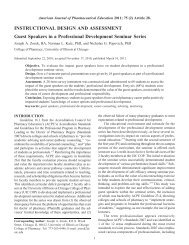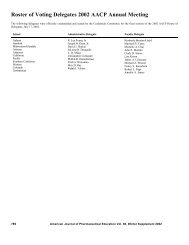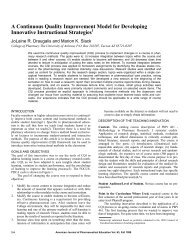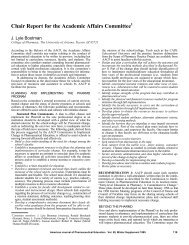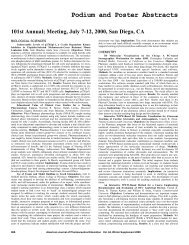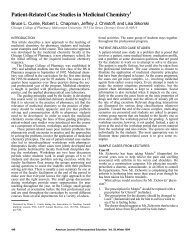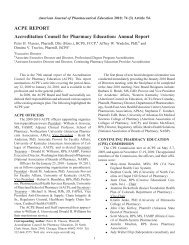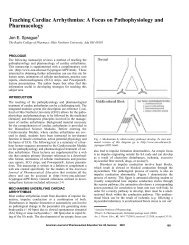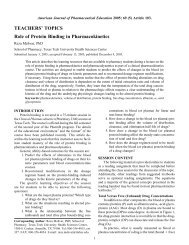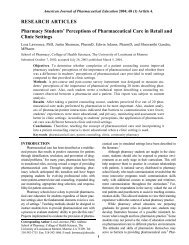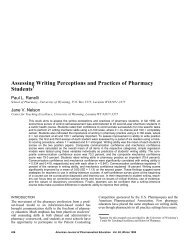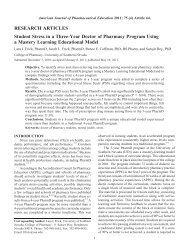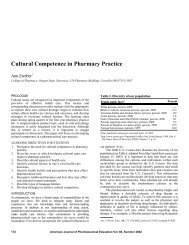RESEARCH ARTICLES Pharmacy Students' Attitudes Toward a ...
RESEARCH ARTICLES Pharmacy Students' Attitudes Toward a ...
RESEARCH ARTICLES Pharmacy Students' Attitudes Toward a ...
Create successful ePaper yourself
Turn your PDF publications into a flip-book with our unique Google optimized e-Paper software.
American Journal of Pharmaceutical Education 2009; 73 (7) Article 134.<br />
thought the course had practical value (Table 3). Only<br />
one-third of students selected ‘‘extremely’’ or ‘‘very’’<br />
scale anchors for the different adjectives in the apathy<br />
factor of the adjective rating scale, affirming the finding<br />
that few students had negative feelings towards the<br />
course. Approximately, two-thirds of the students chose<br />
the ‘‘slightly’’ scale anchor for the 2 adjectives (demanding<br />
and difficulty) in the difficulty factor of the adjective<br />
rating scale, indicating that students felt that the course<br />
was only slightly demanding and difficult.<br />
Students’ attitudes towards development of a public<br />
health program were positive. More than 80% agreed or<br />
strongly agreed that the program would be an opportunity<br />
to help the community, promote the practice of pharmacy,<br />
apply their knowledge, and make a difference. Few students<br />
indicated that it would be a poor use of time and an<br />
example of busy work, or be a bad experience of working<br />
in groups. Approximately 1 in 4 students disagreed that<br />
the public health program would be an overwhelming responsibility<br />
(Table 4). None of the demographic variables<br />
such as age, gender, marital status, average annual household<br />
income, and level of education achieved were associated<br />
with summative scores on students’ attitudes<br />
toward the development of a public health program.<br />
4<br />
DISCUSSION<br />
As the most accessible and trusted healthcare professionals,<br />
pharmacists are in an ideal position to play an<br />
important role in public health promotion and disease<br />
prevention activities. 18 From a pharmacy education perspective,<br />
the findings of this study that pharmacy students<br />
were positive towards a required public health course and<br />
developing a public health program are encouraging. The<br />
majority of the students indicated that the program would<br />
be an opportunity to help the community, promote the<br />
practice of pharmacy, apply their knowledge, and make<br />
a difference in society. Despite that the program development<br />
aspect of the course demanded that students complete<br />
a number of difficult and time-consuming tasks,<br />
only 1 in 4 students found the course to be difficult and<br />
demanding. Students appeared to be able to quickly adopt<br />
and apply the course skills and achieve efficacy. Their<br />
attitude may have been ‘‘This is not difficult to do.’’<br />
The lack of apathy toward the course among students<br />
could be attributed to the departure of this course from<br />
the highly clinical pharmacotherapy courses in the curriculum.<br />
Alternatively, it also could have been a reflection<br />
of the positive energy displayed by the faculty members in<br />
the course. Although not measured, faculty members who



